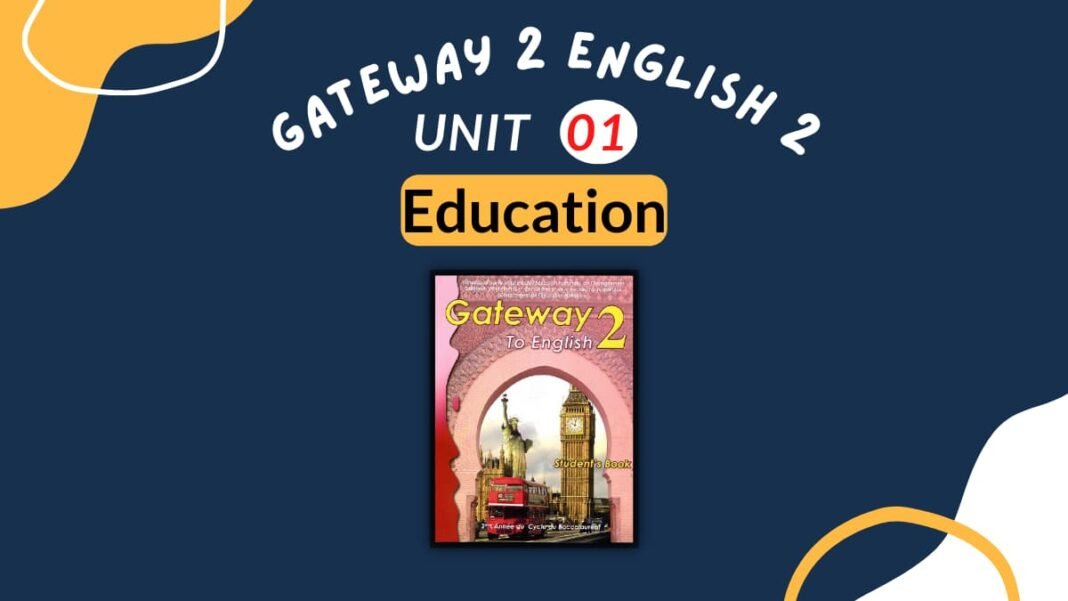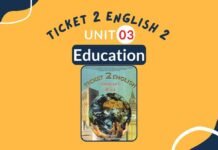“Gateway 2 Unit 1 Education” is a unit that introduces the topic of education in English. It covers a wide range of vocabulary, functions, grammar, and writing skills.
TABLE OF CONTENT
- Vocabulary
- Functions/Communication: Making Request
- Grammar: Gerund and Infinitive
- Writing: Linking Words
Vocabulary Gateway 2 Unit 1 Education
Types of Education
There are many types of education, but the most frequent ones are Formal, Non-formal, and informal education.
- Formal education: refers to the types of learning that are taking place in an educational institution, where there is a syllabus and a teacher, and is usually recognized in a qualification or a certificate.
- Non-formal education: refers to learning through a program (like formal education) but is not usually evaluated and does not lead to certification.
- Informal education: refers to any learning resulting from activities related to our daily life.
- Vocational education: Prepares learners for careers or professions related to a specific trade, occupation, or vocation.
- Special education: Describes an educational alternative that focuses on the teaching of students with special (behavioral, health, academic, or physical) needs that cannot be met using traditional programs or techniques.
- Inclusive education: It addresses the learning needs of children, youth, and adults, especially those who are vulnerable to marginalization and exclusion.
- Gifted education: is a broad term for special practices, procedures, and theories used in the education of children who have been identified as gifted or talented.
- Basic education: The whole range of educational activities taking place in various settings (formal, non-formal, and informal) that aim at meeting basic learning needs such as reading, writing, and arithmetic.
Examples of Education
- Formal education: Secondary school, vocational training workshop, university studies.
- Non-formal education: Evening classes, literacy classes.
- Informal education: Theater, television, daily life in general.
Collocations
A collocation is a pair of words that generally goes or occurs together. Here are some related to education.
Examples:
- Higher education
- University graduate
- Free classes
- Learning needs
- Mixed classes
- Cultural background
- Adult illiteracy
- Education system/goals/background
- School subject/year/uniform
- Private lessons/institution/school
- Equal opportunities/rights/status
Functions/Communication: Making Request
A request is asking someone to do a favor or for something. It’s essential to be polite when doing so. Making and responding to a request can be done in different ways. The following lines will show you how.
Making Request
- Could you please…….?
- Can you………….?
- Will you……….?
- Do …….(something)…… for me, please.
- Is there any chance you could…?
- Do …….(something)…… for me, will you?
- Do you think you could………?
- Could you possibly…….?
- I wonder if you could………?
- Do you mind (verb+ing)………? (it is like saying: Is there a problem if….?)
- Would you mind (verb+ing)………? (it is like saying: Is there a problem if….?)
Responding to Request
Accepting Request
- Yes, sure.
- Sure.
- Yes, of course.
- Certainly yes.
- With pleasure.
- Sure, don’t worry.
- Sure, no problem.
Refusing Request
- Oh, sorry, I can’t.
- I just can’t; I am sorry.
- I am afraid but I can’t.
- Certainly not.
Examples:
- Speaker 1: Could you please help me with this exercise?
- Speaker 2: Yes, of course.
- Speaker 1: Do you mind going with me to the market?
- Speaker 2: No, I don’t mind (accepting request)
- Speaker 1: Would you mind giving your brother a lift downtown?
- Speaker 2: Yes. (refusing request).
- Speaker 1: I wonder if you could repair this engine?
- Speaker 2: Sure, don’t worry
Grammar: Gerund and Infinitive
Click here to see this lesson: GERUND AND INFINITIVE.
Writing: Linking Words
- Adding information or emphasizing a statement: and, also as well as, moreover, furthermore, in addition, additionally, next, secondly, thirdly……
- Making comparison: similarly, likewise, in the same way, equally…….
- Expressing concession and contrast: although, however, yet, but, despite, whereas, in contrast, while, Conversely….
- Providing reasons: for this reason, To this end, for this purpose, because, since, so that….
- Explaining results: as, as a sequence, as a result, hence, therefore, thus, so…
- Providing examples: for example, for instance, In other words, such as….
- Drawing conclusions: as has been noted, finally, in brief, in short, to summarise, consequently, therefore, In Conclusion, In other words, accordingly ……
Advertisement




Thanks a lot for such a great job
شكرا استاذ
you are the best motherfucker teacher i’ve seen it before
Thank you M.Nabil , I consider you efforts and your website and I have chance to learn the true english from your interesing lessons an I hope q.Allah help u .well done ☺
You are most welcome, Anonymous. Thanks should go to you for your nice words 🙂
tank you so much
My pleasure
عفااك مغديش تحط تخراج ديال ص 16 نص ديال
The development of human learning
Thank you so much Mr Nabil … it’s very helpful 🙂
You are welcome 🙂
❤️
Thanks so much. Your voice is not so clear. Try to improve the audio quality. ✌
Thank you teacher
Welcome
kind of you to share with us your experience in teaching. Nice to meet you
[…] Gateway 2 unit 1 : Education […]
Could you give as a list of formal informal non formal education
Tank y ou sono much
thnx
thanks
tnx
Never mind
a million thanks to you teacher for your efforts that you have made to make us successful
a million thanks to you teacher for your efforts that you have made to make us successful
thanks si nabil your website is great may ALLAH reward you;
Ameen, my dear.
Think you very mich
Don’t mention it.
Thank you very much teacher 🙂
Don’t mention it it Taha 🙂
Nice to meet you MR. Nabil
Nice to meet you too Mr. Basri 🙂
THANKS A LOT
WIth pleasure 🙂
شكرا أستاد نبيل بزاف بزاف معاك فاطمة الزهراء من جرسيف
مرحبا ميس فاطمة الزهراء 🙂
شكرا بزاف بزاف أستاد نبيل معاك فاطمة زهراء من جرسيف
I would like to thank u a lot for all, it’s really very important i hope i can be a successful teacher like u sir thanks again 🙂
There is nothing to thank for. It’s a duty.
I believe I am not that successful teacher to be the same as.
But still I have to say thank you for your warm speech 🙂
Hello, Sir
I would like to warmly thank you for the efforts you have made to make such an interesting Website . it s really very helpful for high school students . i have come across it by chance . you have been sharing the information . may Allah help you .
thanks a bunch for your warm encouraging words. May Allah help you too 🙂
Thanks for this outstanding work. Good job. I like your selfie with the students.
Not At all Anonymous 😀
That was one of the best selfies for me 😀
thanx a million Mr, Nabil
It’s a must Mr. Anonymous 😀
Thanks for sharing.
It’s amazing ☺
It’s a pleasure and duty Miss Bouchra 🙂
Thnks for ur efforts.thnks again for sharing ur efforts.
it’s a duty 🙂
Tnx ssi nabil though i see that our ss will just copy n paste for class participation
🙂
some of them may do that. But I think at least copying and pasting is an effort in itself 😀